Taihei Shimamine graduated from the Nagaoka University of Technology at the beginning of this year and is currently following his career in the cybersecurity industry. He majored in Information and Management Systems Engineering and was part of Nishiyama Laboratory under Associate Professor Yuta Nishiyama. The Nagaoka Review spoke with him to know more about his research on the behavior of cellular automata (one of the most important developments recently and an area of great potential in scheduling problems), his international student experience, and future plans.
NR: Today, I’d like to ask you about research-student life from a graduate student perspective. To begin, can you please tell us about the research that you conducted during your master’s degree at NUT? How you get interested in this topic?
TS: I have always been interested in philosophy and cellular automata (CA), (according to Stanford Encyclopedia of Philosophyedu, Cellular Automata are discrete, abstract computational systems that have proved useful both as general models of complexity and as more specific representations of non-linear dynamics in a variety of scientific fields.) When I spoke with Professor Nishiyama about my interests regarding the self-referential and automatically cellular paradox, he introduces and recommends analyzing a substitution system that he finds highly relevant to these topics.

Image of Substitution System via Wolframscience
TS: Cellular automata consist of many identical components, each simple. But together capable of complex behavior. They are analyzed both as discrete dynamical systems and as information-processing systems. My research was based on analyzing a permutation system’s qualitative and quantitative behavior through a mathematical model by applying simple rules to networks. Primarily, this study discussed a grid switching replacement system that adds new elements (new rules, hierarchy, deviation from grid division) to the replacement system. Maybe you’ll ask why we need this kind of research so let me explain that CA is widely used for its easiness to represent systems governed by natural rules in discrete steps and their ability to represent the interaction between individuals with the surrounding neighborhood. CA also provides a formal framework for exploring the behavior of complex systems.

Two-dimensional cellular automata. Image via Wolframscience
The picture show steps in the evolution of two-dimensional cellular automaton whose rule specifies that a particular cell should become black if exactly one or all four of its neighbors were black on the previous step but should otherwise stay the same color. Starting with a single black cell, this rule yields an intricate, if very regular, pattern of growth.
NR: How would you present the result of this research?
TS: The phenomenon of self-organized criticality is known as the mechanical background of the law of power that can be seen in natural phenomena such as earthquakes and the disappearance of living species. This research analyzed whether this phenomenon could be seen in the network switching substitution system, a mathematical model that introduces a new mechanism. The results did not suggest this, but we confirmed a significant structural change in a short cycle.
NR: During your bachelor’s degree (4th grade), you also followed an internship at the Polytechnic University of Catalonia in Spain; what inspired you to choose this program?
TS: Firstly, I was interested in European culture and life, and one of the best ways to discover it’s to experience it directly. Secondly, I was driven by the idea to research overseas universities and expand my heart rate data analysis knowledge. It was a short six-month internship (from September 2018 until February 2019) that offered personal and professional (research/educational) experience.
NR: How would you describe your experience in Spain?
TS: It was a new experience for me. I joined my internship at a time when Catalonia is challenging its independence from Spain. Of course, this situation did not affect my studies; instead, I had the opportunity to see a different cultural side. In Japan, I have not come across a situation where identity is discussed at such a high level and reaches such proportions, and for me, it was a completely new experience. I also discovered another cultural difference. European people will follow their work schedule to appreciate their free time. During all the time I spent there, my teacher recommended I focus on my research, but at the same time to enjoy my free time and discover their culture. I found this interesting and, in fact, by balancing my study and free time, I have had many more opportunities to enjoy the European lifestyle and to have a higher degree of happiness.

Taihei during his internship at Polytechnic University of Catalonia. Image courtesy of Taihei.
NR: What kind of challenges did you face being in a different country, and how did you overcome them?
TS: I think at the beginning, everything was related to cultural and language differences, especially the language barrier. Getting to know new people wherever you are is a critical element in helping you to integrate better and understand the environment. By interacting more with people, especially with my professor and colleagues from the laboratory, I gained much more confidence in my language skills, focused more on my research by discovering and analyzing new perspectives, and understanding the differences between cultural aspects.
NR: Why would you recommend studying abroad?
TS: The truth is, studying overseas has many fantastic benefits, from learning new languages, appreciate other cultures to improving your social life, overcome the challenges of living in another country and gain a greater understanding of the world. Personally, one of the most significant advantages of studying abroad is the chance to become immersed in a different environment and learn or improve another language. This enriching experience helps you to see and do things you wouldn’t expect and meet people who have grown up in a different culture. In this case Europe, with its co-crossed cultures it’s an excellent example.
NR: What are your future plans?
TS: I’m currently working in the cybersecurity industry. However, I still collaborate with international companies on different projects and participate in many national and international conferences because of my deep research interest. In the near future, I’m thinking about studying abroad and develop more international collaborations.

”The pursuit of scientific excellence doesn’t stop at a defined geographical border.










